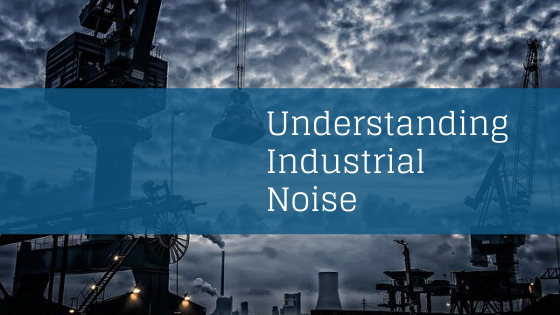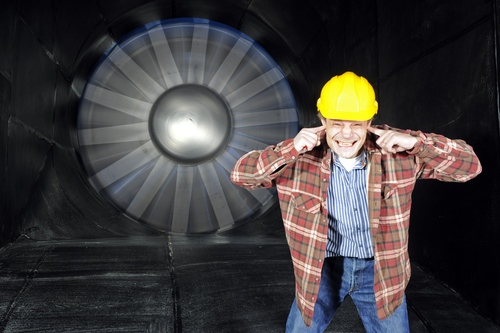Loud sounds are commonplace in plants, warehouses, traffic hubs, and manufacturing businesses.
While workers know the loudness is standard in any of these areas, they may not realize how dangerous the equipment is to their hearing and health.
The Occupational Safety and Health Administration sets forth guidelines to restrict the exposure workers have to sounds and noise that reaches a particular level.

What Is Industrial Noise
Workers in factories and machine shops across the globe are exposed to many kinds of noise and frequencies. Constant, repetitious, or excessive sound above 85 decibels can damage a worker’s ears.
Permanent damage happens when exposure to these sounds is not limited by:
- Sound Walls
- Sound Enclosures
- Employee Protection
In many cases, personal protection like earplugs is not enough to stop the damage.

Common Offenders of Excessive Industrial Noise
Industrial noise is the sound that comes from:
- Vents
- Blowers
- Steam Valves
- Exhaust Fans
- Air Compressors
- Power Tools
Equipment with fans is a big offender because the blades cause various frequency changes. The higher pitches can pierce earplugs and cause irreparable hearing damage.
Wood shops are another source of unwanted noise for work crews. These shops use lathes, drills, saws, and sanders that combine to create a lot of excessive noise.
Exposure to this equipment for over eight hours a day is enough to cause permanent damage even if the levels stay below the recommended range.
Does a Concrete Sound Barriers Work?
While concrete sound walls was once thought to be the best way to block sound, science has proved the noise can reverberate above these types of barriers. The bad part is that many concrete walls have gaps for doors and walls that allow loud sounds to escape.
Even if the enclosure is much higher than the equipment, the sound waves will bounce back and forth across the walls until it finds an opening.
If there is not a ceiling to block in sound, then the walls carry the noise up and over the enclosure letting it reach unwanted areas.
Sound Barriers Can Help Businesses Regulate Noise
A more effective solution for getting rid of sound waves is an acoustic enclosure. These mobile structures are commonly seen along the sides of the highway to protect residential areas from the excessive sound of traffic.
Although these enclosures are exceptional for helping get rid of outdoor noise, the same applications can work wonders inside of industrial businesses.
Companies using heavy machinery and noisy equipment can protect employees with an acoustic sound barrier wall.
These walls use sound enclosure panels with acoustic dampening materials. The walls take in the sound wave and move it along a series of turns taking out the energy and causing the wave to lose effectiveness.
When the sound exits the back of the panels, the noise is essentially gone or much less than when it entered.
Three Ways to Minimize Noise:
- Enclose The Source
- Protect The Receiver
- Mitigate Sound Along The Path It Travels
Other Advantages of Sound Walls
An outdoor sound wall is appealing because there are several color and pattern options business owners can choose.
Acoustic barrier walls will not rust or rot away. They can last for decades and use recycled content.
The best thing is that these walls are easy to disassemble and reconstruct for another project. This mobility is especially helpful for workplaces where construction moves from one point to another as the job continues.
Why Sound Enclosure Panels Work
A sound wall is much more effective than a concrete noise barrier because it eliminates the sound instead of redirecting it in another area or direction.
Using a concrete barriers inside a business may help one group of people while causing more problems for people outside the business.
An acoustic sound wall uses up the energy of the sound wave where concrete can only reflect it.
Acoustic barriers provide advantages with usage on doors, windows, and ventilation openings that incorporate insulation and sound dampening materials.
These items are specifically made to decrease the noise that gets past sound wall openings. For this reason, acoustic barriers offer a better solution for mitigating noise from industrial equipment.
Who Benefits From Acoustic Barriers
Not only do employees in the direct path of the loud noise benefit from acoustic barriers, but so do people in the rest of the plant.
These walls kill the sound instead of bouncing the noise around the building. Plus, acoustic walls will never amplify the sound because we design the walls to absorb and redirect the noise until the sound wave lessens in intensity and frequency.
To find out more about industrial noise abatement and how acoustic sound walls can help your business, give our Sound Wall team a call.
Our team can explain the science behind reducing the sound waves, how the acoustic walls work, and how long it takes to place or move the acoustic system.
Most evenings in Trail B.C Teck starts a noise that sounds like jet engines. The noise is seldom heard during the day. As a newer resident I phoned the company, and the BC ministry who both told me “No one else has a concern”. I know two residents that have left, a business owner that is selling and a worker that complained and has since quit and many residents that have called, If the noise is loud miles away, I can only imagine the workers (perhaps why only at night?) What can be our recourse . ?
On this site, explore a variety of online casinos.
Whether you’re looking for well-known titles latest releases, there’s a choice to suit all preferences.
The listed platforms fully reviewed to ensure security, enabling gamers to bet peace of mind.
casino
Moreover, the platform provides special rewards plus incentives for new players and loyal customers.
Due to simple access, discovering a suitable site takes just moments, enhancing your experience.
Stay updated about the latest additions through regular check-ins, because updated platforms appear consistently.
On this platform, you can discover a wide selection of slot machines from famous studios.
Visitors can experience retro-style games as well as feature-packed games with stunning graphics and bonus rounds.
Whether you’re a beginner or an experienced player, there’s a game that fits your style.
casino
Each title are available anytime and designed for desktop computers and smartphones alike.
All games run in your browser, so you can start playing instantly.
Site navigation is intuitive, making it simple to explore new games.
Sign up today, and discover the excitement of spinning reels!
本站 提供 海量的 成人材料,满足 成年访客 的 兴趣。
无论您喜欢 哪种类型 的 影片,这里都 应有尽有。
所有 资源 都经过 精心筛选,确保 高清晰 的 观看体验。
喷出
我们支持 不同平台 访问,包括 平板,随时随地 自由浏览。
加入我们,探索 激情时刻 的 私密乐趣。